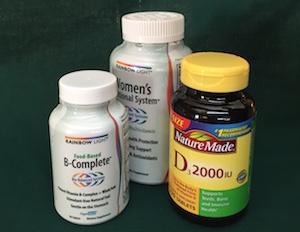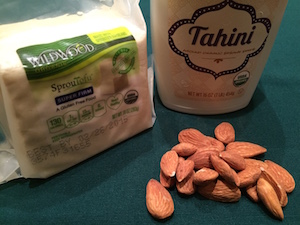


Plant-based vegan diets & bone health: how to get calcium, magnesium & Vitamin D
The second question vegans are asked, after “where do you get your protein,” is usually “so what about calcium? Don’t you need milk products for that?”
Just as we can get all the protein we need from whole food plant-based (WFPB) sources, we can also get all the calcium we need.
Calcium, an alkaline earth mineral, is a building block of teeth and bones and is important in signaling cellular processes. Long-term calcium deficiency can lead to osteoporosis (thinning of the bones), rickets (weakening of the bones) and a reduction in the blood’s ability to clot.
We have grown up thinking that the best sources of calcium are milk, cheese, yogurt, etc. However, many research studies show that the countries in which dairy consumption is the highest, also have the highest incidence of osteoporosis and hip fractures. Dairy products (and meat) create acid in our bodies. Our bodies then pull calcium from our bones, which is highly alkaline, to neutralize the acid, resulting in calcium loss.
It’s important to not only consume calcium (via plant-based sources), but to prevent it from being leached from your bones. Other than eating an alkalizing diet, the Physicians Committee for Responsible Medicine, PCRM.org, recommends limiting salt to 1 to 2 grams per day (since it increases calcium loss via the kidneys), limiting alcohol (since it reduces your body’s ability to build new bone) and not smoking. In addition, it’s important to do weight-bearing exercises (like walking, running, hiking, and lifting weights), and to get enough Vitamin D (see below).
The Recommended Dietary Allowance (RDA) of calcium for adults is 1,000 to 1,200 mg per day and 1,300 mg for pregnant or lactating women.
Plant-based sources of calcium include leafy green vegetables, legumes, nuts, seeds, fortified plant milks and fortified orange juice.
Magnesium is also a building block of bones. The RDA for magnesium ranges from 400-420 mg for adult men and 310-400 mg for adult women. Here are some plant-based foods with the amounts of calcium and magnesium per serving:
| Food | Calcium |
Magnesium |
| Tofu 1/2 c. made with calcium sulfate | 861 mg | 73 mg |
| Orange Juice (calcium fortified) 1 cup | 349 mg | 27 mg |
| Soy milk (calcium fortified) 1 cup | 200-300 mg | 32 mg |
| Collard greens, cooked 1 cup | 268 mg | 40 mg |
| White beans, 1 cup cooked | 161 mg | 113 mg |
| Dried figs, 10 each | 136 mg | 57 mg |
| Tahini (ground sesame seeds) 2 TB | 128 mg | 28 mg |
| Chick peas /garbanzo beans 1 cup canned | 109 mg | 61 mg |
| Swiss chard 1 cup cooked | 102 mg | 152 mg |
| Kale 1 cup cooked | 94 mg | 23 mg |
| Almonds 1/4 cup | 94 mg | 304 mg |
| Sweet potato, 1 cup boiled | 76 mg | 54 mg |
| Broccoli | 62 mg | 33 mg |
Vitamin D is essential for calcium absorption. Our bodies make Vitamin D through exposure to the sun. So many of us have grown up fearing skin cancer and slather our bodies with sun screen. But 10-15 minutes of sun on our bare skin in the morning or late afternoon is beneficial. As we age, our bodies are not as effective at producing Vitamin D from the sun. And foods, even plant-based, may not be enough. Have your Vitamin D level checked by your doctor and take a D3 supplement as recommended. The RDA for Vitamin D in adults is 600-800 IU.
Sources:
- Thrive by Brendan Brazier
- Engine 2 Diet by Rip Esselstyn
- Wikipedia
- PCRM.org
- National Institutes of Health
- The Vegetarian Resource Group
